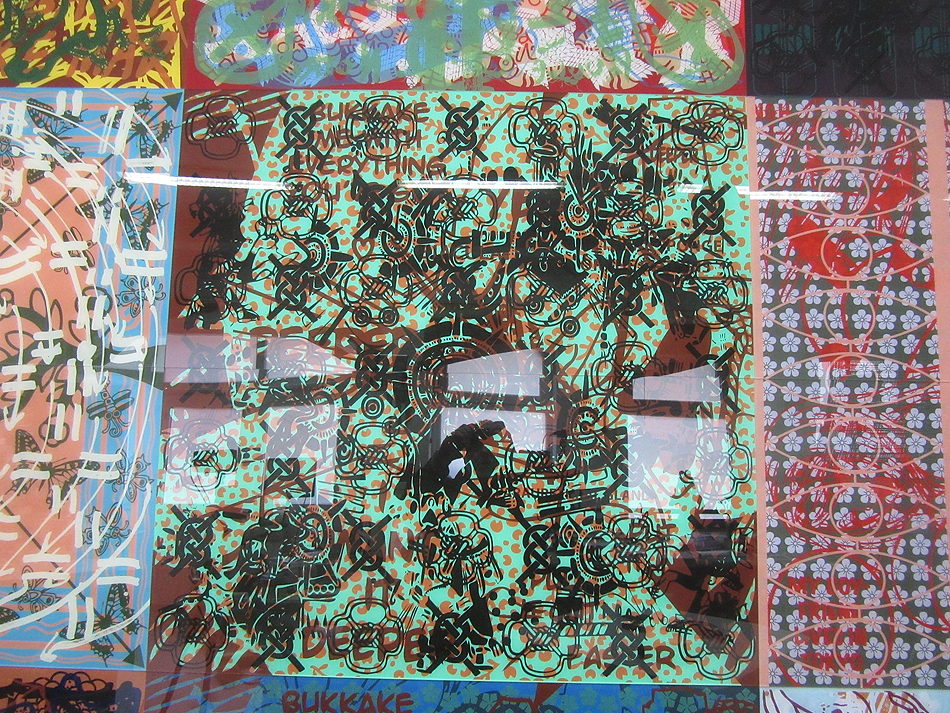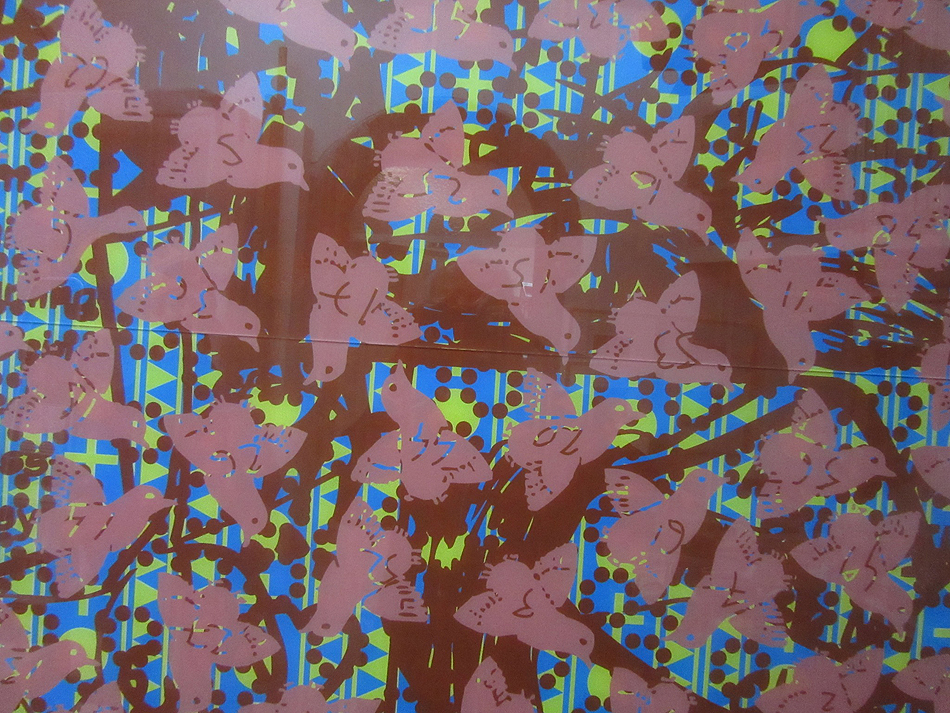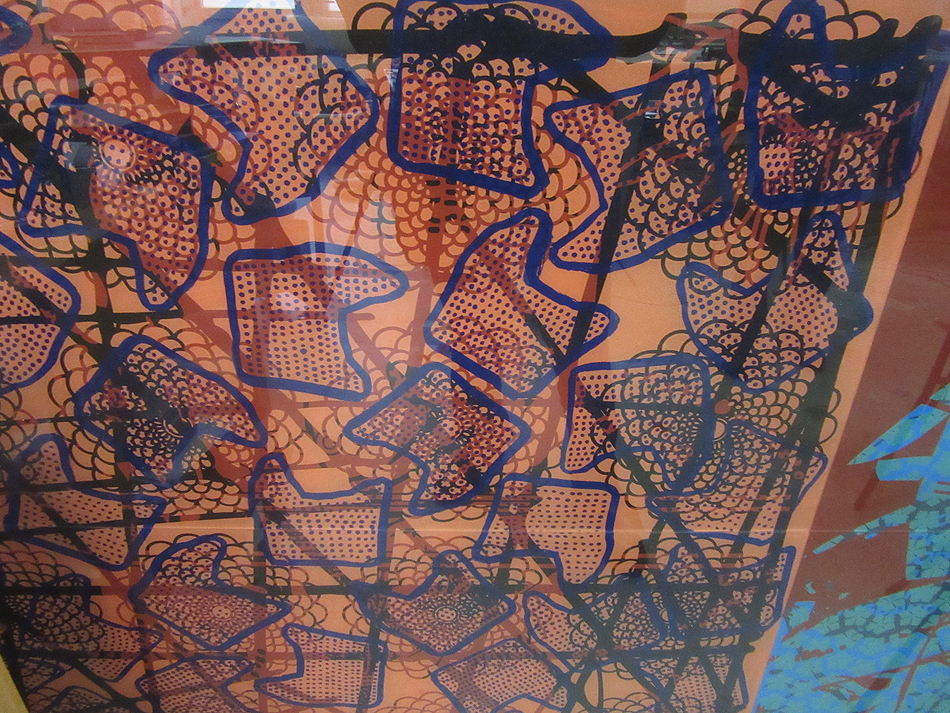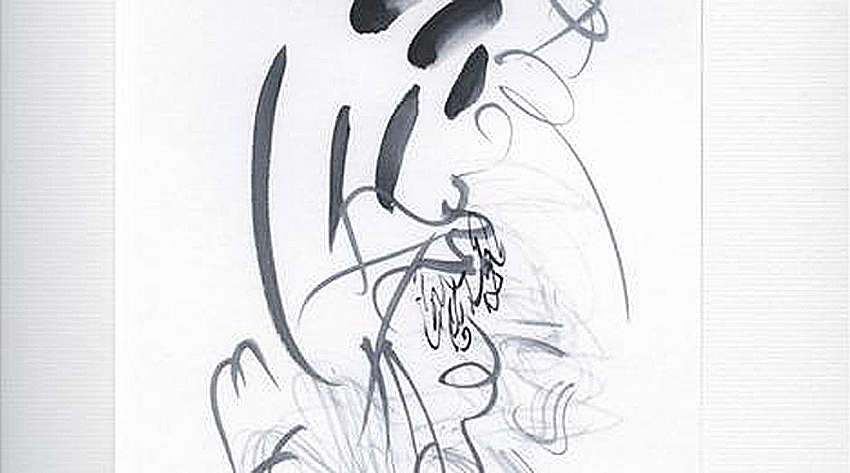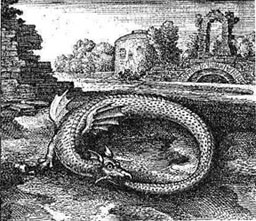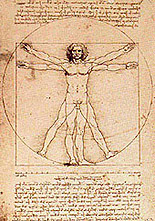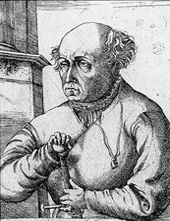Art
Criteria
-- Essay outline by Johnes
Ruta, independent curator & art theorist, 1996.
Katia Jirankova Levanti, Prague, CZ
Jean-Pierre Sergen, Besancon, FR
Anne Graaf, Herecy/ Fontembleau, FR
Christopher Culpo, Herecy/ Fontembleau, FR
Czech artist/dancer/and poet Katia Jirankova Levanti and her husband Daniel Levanti live in Prague 7, her home city,
for six months each year, and in Niantic, Connecticut, Daniel's home town, from May to December.
Her artwork of large oil paintings visualizes the principle of SUBCONSCIOUNALISM, depicting dangerous
entities hidden in the Collective Unconscious of humanity. Her concepts reference the structural/metaphoric psychology of
Carl G. Jung, the Metaphysical Poets of the 17 & 18th centuries, and the Romantic Poets such as Rainer Marie Rilke. As an independent curator, I've exhibited her artwork on several occasions, and on April 15, 2024, on my travel to Prague, CZ ,
I had the opportunity to interview her with various questions about her artwork and thinking... ~Johnes
Press on a painting image to view the Interview video (29:59)
Videos by Johnes Ruta
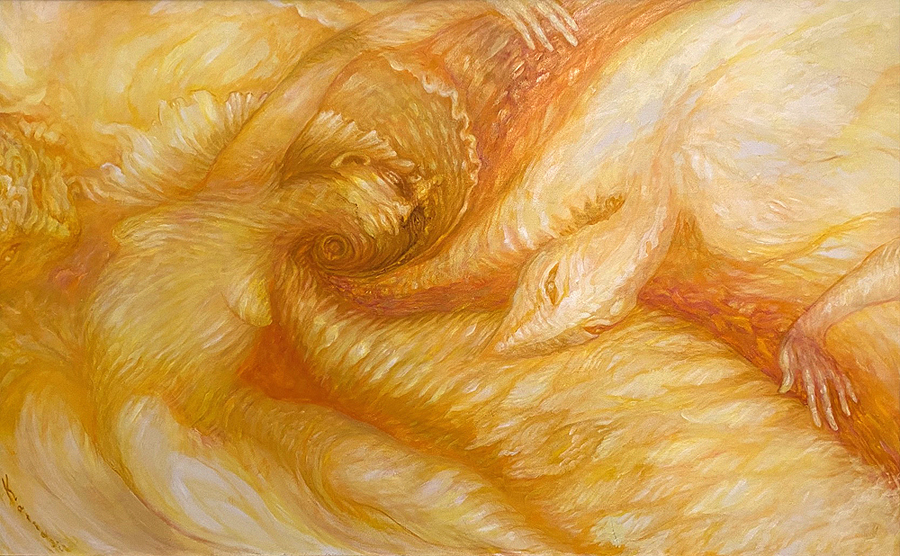
Katia Jirankova -- MEANWHILE IN THE SUN -- oil on canvas, 32" x 48"
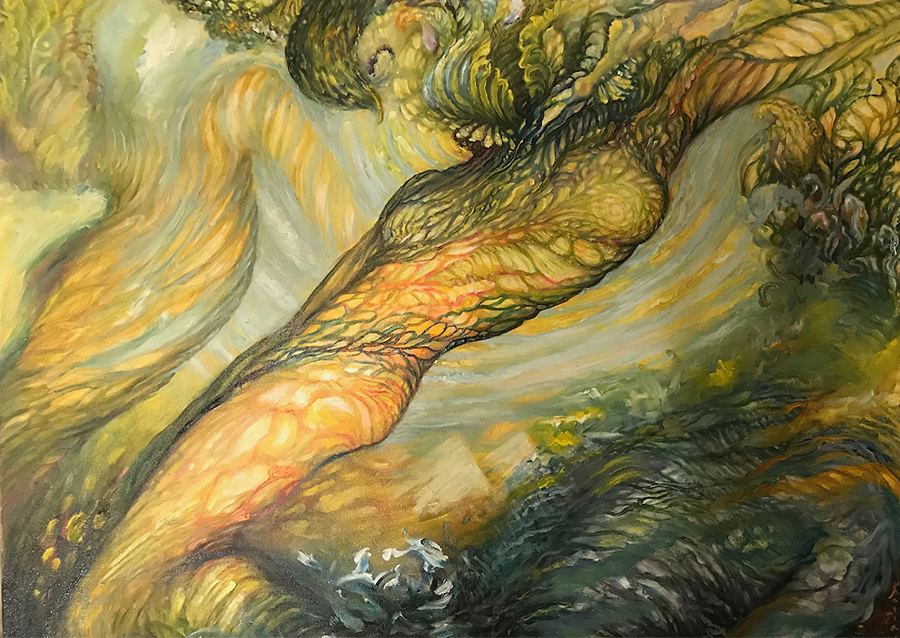
Katia Jirankova -- PLANETTORIUM PILGRIM -- oil on canvas, 30" x 40"
<>
When you stand for long enough amongst Katia Jirankova Levantti’s artworks, you’ll start to feel like you’re leaving the real world behind,
when in fact you’re entering more deeply into it. The meditative, trance-like state from which her work comes is the birth ground of epiphany
itself and Katia brings forth her visions of a world even more secretive and unknown than those magical streets of her Prague childhood.
She writes, “I arrived at the name “Subconsciounalism” to describe my work after studying deeply in the philosophies and writings
of people like Carl Jung and poets like Rainer Marie Rilke, whose understanding of the universe and mankind - though originating from
different ends of the scientific and philosophical world - seemed to meet me at the apex of the symbolic pyramid. As one of them said,
the four walls could be seen as the four great world religions, all arriving from opposite directions at the common point: where
“The eye of God opens”.”
Besancon, FRANCE April 21, 2024
"Interview with my lifelong friend, Johnes Ruta, who came from the USA to visit me and other artist friends in Prague, Vienna and Paris during his trip to Europe in the spring of 2024. We filmed these interview series on Sunday April 21 2024, and it was very cold in the studio. Johnes, as always, had a lots of interesting questions to ask me.... " ~Jean-Pierre Sergent
About Johnes Ruta
: "As an arts activist, I consider it my personal mission to develop
public understanding of individual creativity, especially toward the
appreciation of arts, culture, and the positive evolution of humanity."
https://www.j-psergent.com/
To view
the interview - please click on any of the silkscreen
"reverse-glass" (plexi) artworks shown here:
(Note: the "reverse-glass" technique indicates a painting
created on a transparent surface, where the
foreground is painted first, then the successive layers of background,
so that the glass is then turned
inside a frame, with the first painted layers displayed and illuminated
under the obverse face.)
https://www.j-psergent.com/media/videos-interviews/videos-interview-sergent-ruta/255
- ON THE WORK OF JEAN-PIERRE SERGENT / TRANSVERSALITY
From the paper by PhiloSopher Marie-Madeline Varet, Paris, 2024
It is part of the "traversée" of contemporary art, a journey, a path: "... there is no end, only the path. But I'd like to be, modestly and on my own scale, like the great jazz drummers: jazz drummers are always just a little ahead of the music playing, and that's what makes the soloists pulsate and throws the musicians they accompany totally forward. When you're slightly ahead of the beat, it's because you're doing your job well." Jean-Claude Guillaumon, "L'art, fabrication ou transgression" (Interview by Abdelkader Damani. Published in Le Croquant n°55-56, 2007).
In Les Carnets de Malte, Rilke describes the source of his poetic inspiration: "Verses are not made, as people think, with feelings (we get those all too soon) - they are made with lived experience. To write a single verse, you have to have seen a lot of cities, a lot of people and a lot of things, you have to know the animals, you have to feel how the birds fly and know the movement that makes the little flowers open in the morning. You have to be able to remember routes through unknown lands, unexpected encounters and long-planned goodbyes [...] And it's not really enough to have memories. You have to be able to forget them, when they are numerous, and you have to have the great patience to wait for them to return. For memories are not yet enough. They must first merge with our blood, with our gaze, with our gesture, they must lose their names and no longer be discernible from ourselves; then it may happen that in the course of a very rare hour, the first word of a poetry verse emerges in the midst of them and emanates from among some of them". Indeed, this text can be applied to all the arts, but also to mystical experience, whether Christian, Jewish, Sufi or Taoist. Once our experiences merge with our blood, once we have digested, meditated and forgotten them, they become profound, unforgettable and truly spiritual and transcendent. "A true artist paints or writes with his blood", says Nietzsche: in other words, with his life.
Fontainebleau am Seine, FRANCE April 30, 2024
Open Center. It turned out that we had quite a number of mutual friends, and similar thoughts on metaphysics. She is
a profound poet and a painter of deeply atmospheric ink-washes...
********************************************************************
Anne Graaff is an artist and a writer living in Fontainebleau France, with her husband composer Christopher Culpo.
“Poetry is my ongoing stream of personal reflection through language,” she says in her website intro. https://www.annegraaff.com/
“Art making is my ongoing stream of personal reflection on the world through visual language. sometimes I combine
the two, as in some of my artists’ books. As an art historian I write on many subjects but have a special fondness
for Outsider Art. I hope you enjoy browsing through my thought forms.
“I like to see my mind at work, the art mind. I like the way one thing leads to another and surprise outcomes occur,
art outcomes. I like surprising myself. I like working with materials in a sensual way. I like the stuff of stuff – and
the way materials can be coaxed to speak. I like playing with art materials in a way that opens the door to accidental
effects – so that the materials also speak for themselves. I like the back and forth between accident and control,
as the artwork comes into being. I find this process to be mysterious and fascinating. This is why I am an artist.”
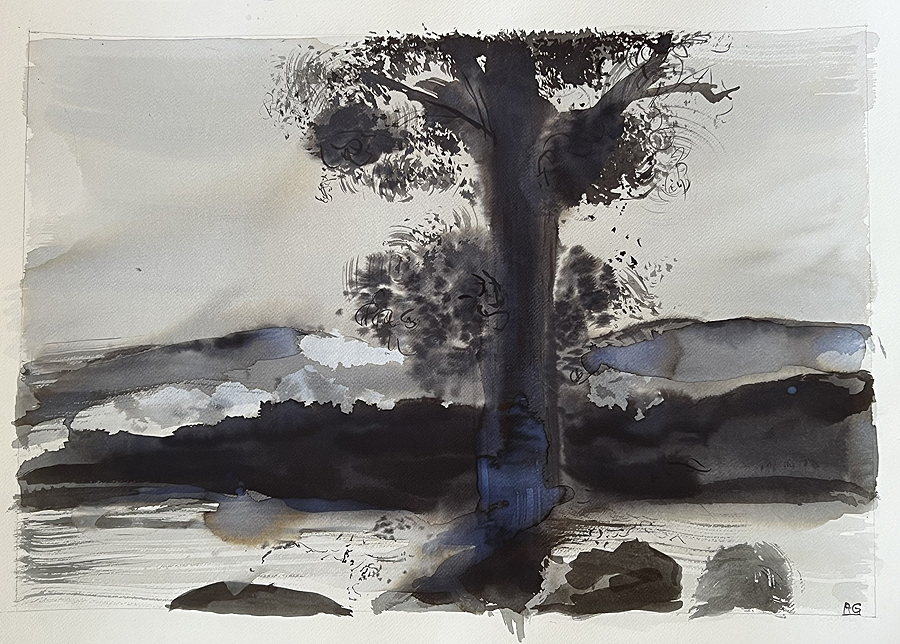
Anne Graaff -- CEDAR LAKE, ANCIENT BLUEGUM -- ink & wash, 70 x 50cm on 300g Fabriano Water Colour paper
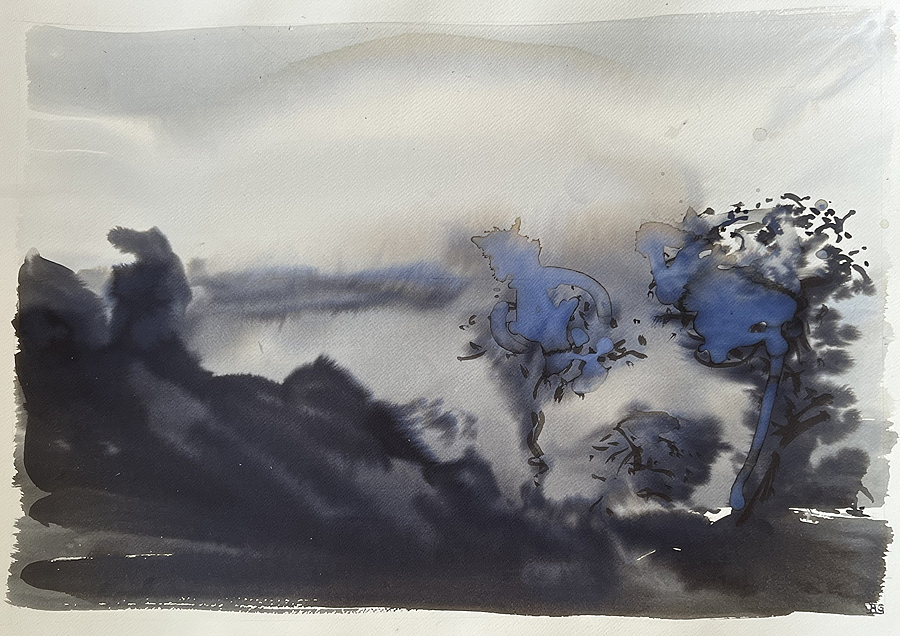
Anne Graaff -- CEDAR LAKE, TWO TREES -- ink & wash, 70 x 50cm on 300g Fabriano Water Colour paper
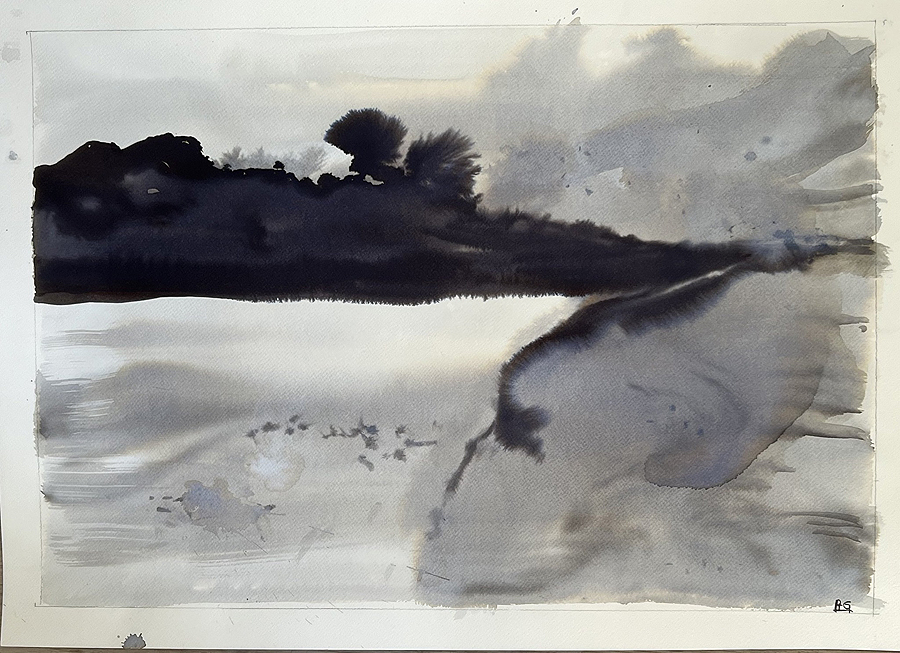
Anne Graaff -- CHURCH HAVEN, LAGOON 1 -- ink & wash, 70 x 50cm on 300g Fabriano Water Colour paper
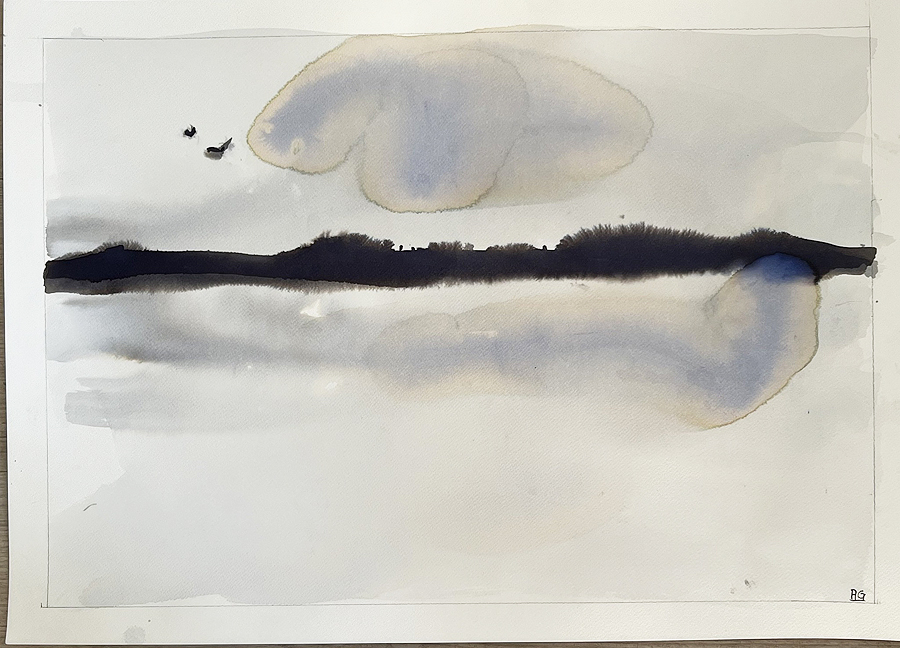
Anne Graaff -- CHURCH HAVEN, LAGOON 2 -- ink & wash, 70 x 50cm on 300g Fabriano Water Colour paper
As a performer and composer, Culpo lies at the confluence of contemporary classical music, jazz, and free improvisation. He has written chamber and symphonic music, vocal and opera, for the dance and the theatre, and has composed and improvised music for silent films. He has been commissioned by Radio France. https://christopherculpo.com/
Culpo has earned degrees in composition from Boston University and The Juilliard School, where he studied amongst others with Milton Babbitt and David del Tredici. He also studied piano and improvisation with Charles Banacos.
Following his studies at Juilliard Mr. Culpo was the personal assistant to Aaron Copland and an active Teaching Artist
for the Lincoln Center Institute. Since receiving a Fulbright scholarship to work with Tristan Murail in Paris in 1991, Mr. Culpo has lived and worked in Europe. He is married to artist/poet Anne Graaff, living in Fontainbleau, France, upstream
by the Seine River.
Culpobility:
https://www.youtube.com/watch?v=1qWSf_70zfk
The Spectral Life of Things - Twisters:
https://christopherculpo.bandcamp.com/track/twisters
The Invisible Gondola:
https://www.youtube.com/watch?v=pSaYrboB9Jc
The Spectral Life of Things - Space For Lines:
https://christopherculpo.bandcamp.com/.../the-spectral...
Art Critiques:
TRANSITION
and the SUBLIME:
An Art History
of the Early
Renaissance
- by
Johnes Ruta
The Privilege of Solipsism:
Philosophical Art : "The Bermuda Group" 1729 -
Bishop Berkeley - Epiricism, Immaterialism, Idealism
& the ruling class
Lecture Videos added to Metaphysical Forum 2010:
Julianne Davidow - Neo-Platonists in the Renaissance
Richard Harteis - The Metaphysics of Poetry: Emotions, Eros, and Loss
Kathleen Damiani, PhD. - Sources of the Divine Sophia
Magda Mraz - Egypt: Spiritual Transformation of the Universe
Steve Bass, AIA, ICA - Geometry Lessons from the Great Library of Alexandria
Schizophrenia,
Archetypes, and Communication (paper August, 2010)
Art Links
Longinus on the Sense of the SUBLIME
The Web
Gallery contains over 8,500 digital reproductions of European
paintings
and sculptures created between the years 1150 and 1800.
http://www.wga.hu/index1.html
Northern Renaissance Art
Metropolitan
Museum of Art, New York City
The Artcyclopedia
Caesar Ripa (fl. England,
1600) -- "ICONOLOGIA or Moral Emblems
various images of virtues, vices, paffions, arts, Humours, elements &
celeftial bodies"
Caesar Ripa's ICONOLOGIA transcribed by Rawn Clark on Adam McLean's
Alchemy website.
ALCHEMY: An ancient and medieval philosophy combining an occult cosmology with practical chemical experimentation. Originating independently in Helenistic Alexandria and ancient China, alchemy remained a legitimate branch of philosophy in Europe and the Islamic world for 1500 years. In its practical aspects, it became the precursor of modern chemistry. Basing their view upon Aristotelian physics, the alchemists sought to isolate the materia prima out of which they believed all other objects in the physical world could be created. Strong Neoplatonic and Kabbalistic influences pervade Renaissance alchemical tracts and a mystical approach based on occult correspondences and 'sympathies' became increasingly apparent. The practical alchemist sought three things: the Elixir of Life, the Universal Panacea, and the means of transmuting base metals into gold. ["A Dictionary of Philosophy" by Anthony Flew (St. Martins Press, NY, 1979)]
